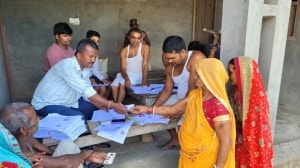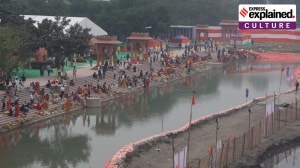In first elections after quota Bill passed, number of women MLAs drops in Rajasthan Assembly
The new House has 20 women MLAs or 10% of total -- with 9 each from BJP and Congress, and 1 Independent. Since 2008, the number of women MLAs has dropped in every election
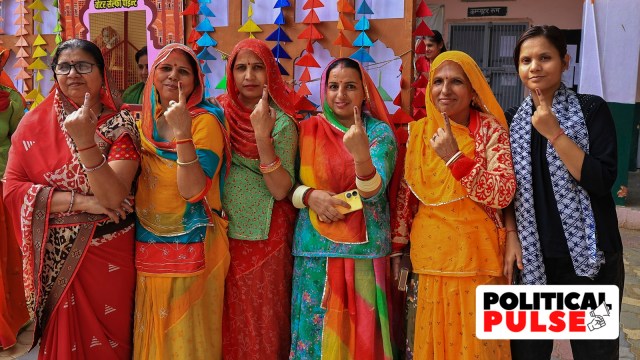 Women show their fingers marked with indelible ink after casting vote during Rajasthan Assembly elections. (PTI Photo)
Women show their fingers marked with indelible ink after casting vote during Rajasthan Assembly elections. (PTI Photo) THE recently concluded Rajasthan elections saw a significant decline in the number of women candidates elected to the Assembly. Only 20 of the 50 in the race won, marking a drop from 23 in the 2018 polls and a more substantial decrease from 28 each in 2013 and 2008. This puts women at 10% of the strength of the 200-member House, significantly less than the 33% quota the recently cleared women’s reservation Bill in Parliament envisaged.
Women did not comprise even one-third of the candidates fielded by either the BJP or Congress. The BJP fielded a mere 20 women candidates, while the Congress fared slightly better with 28 women or 14% of its total candidates.
Among the women MLAs who won, 9 each belong to the BJP and Congress, while 2 are Independents.
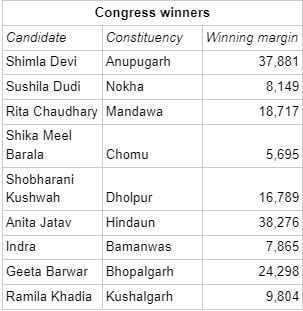
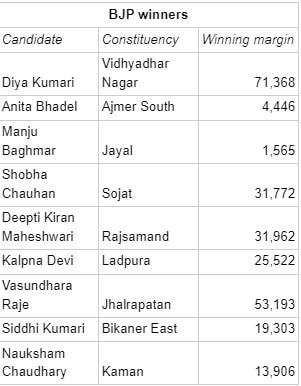
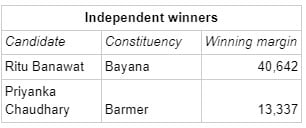
During the elections, women outpaced men slightly in the voter turnout, with 74.72% of women voters casting their ballot compared to 74.53% for men. In the 2018 elections, they had outnumbered men by a higher percentage, 74.66% to 73.49%.
In the run-up to the polls, the BJP highlighted a surge in crimes against women as a key election concern, while the Congress relied on its women-centric programmes, such as providing free sanitary napkins and free smartphones.
They may have taken such measures, but when it came to fielding women candidates, both parties fell short. Take Barmer, where the 2016 rape and murder of a 17-year-old Dalit girl had caused major ripples. The Congress government that came to power in 2018 had renamed a village after her. In this election, neither the Congress nor the BJP nominated a woman candidate, and BJP rebel Priyanka Chowdhary, who contested as an Independent, won.
Chowdhary, who defeated three-time sitting Congress MLA Mewaram Jain, told The Indian Express: “Election jeetne ke liye baatein sab karte hain. Jab actual mein support ka time aata hai, tab sab peeche ho jaate hain (To win elections, everyone talks big, but when the time comes to extend support, no one steps forward). We have to fight to get political representation. Male politicians don’t want women to succeed or come forward… They find a dedicated, hard-working and strong woman politician a threat.”
She added that the BJP rejected her candidature despite surveys showing her as the preferred nominee. “The district-level party organisation didn’t accept that. There was not a single woman among the ones who decided against my nomination. I have been dedicatedly working in the party for 15 years; nobody cared. We needed to have a female candidate representing the constituency, especially this time, but my plea fell on deaf ears.”
Political analyst and senior journalist Tabeenah Anjum points out that the situation for women candidates has not changed despite the state having had a two-time woman Chief Minister in Vasundhara Raje. “The Congress did not give a ticket to Shafia Zubair, making her the first sitting MLA to be excluded… The party retained over 80% of its sitting MLAs in subsequent lists,” Anjum says.
Shafia, a science graduate and the incumbent MLA from Ramgarh, was replaced with her husband Zubair Khan, in the second Congress list. Anjum says Shafia is known for her oratory skills and was a visible face in the constituency. “She had won the seat by over 10,000 votes in 2018,” he adds, attributing the change to the “preference” for male candidates.
Of the total 20 women candidates fielded by the BJP, 10 belonged to the reserved category, whereas 11 of the 28 women fielded by the Congress were from the reserved category. Political analyst Ashfaq Kayamakhani says, “On the reserved seats, there are fewer candidates compared to general seats. It’s an example of tokenism; parties feel that ‘We have to field some women candidates in the elections’, so they choose these seats.”
“Tribal seats have more women voters, hence they choose these seats to field women candidates. Parties prioritise their own interests rather than genuinely considering the empowerment of women in such decisions,” Anjum says.
While examples of women leaders from political or royal families abound, Kayamakhani points out that senior male politicians, in contrast, promote their sons and very rarely let their daughters come forward. “Ashok Gehlot, Rajesh Pilot, Ramnath Singh, Narayan Singh, Gopal Khandela are just a few examples,” he says.
Anjum also points out that while many former student leaders, like the state’s outgoing Opposition leader Rajendra Rathore, have succeeded in politics, women face challenges in making the transition. In 2011, Prabha Choudhary became the first woman president of the Rajasthan University Students’ Union, making headlines. “Where is Prabha Choudhary now? After the academic session, she faded into obscurity, and is not a candidate for MLA from any party. Some of her male counterparts who started in student politics much later are now sitting legislators,” she says.
Talking to The Indian Express, BJP sitting MP Diya Kumari, who won from Vidhyadhar Nagar seat by the highest margin in the Rajasthan elections, said things are set for change. “The women’s reservation Bill has been passed only recently. It will have more of an impact in the forthcoming elections. The BJP is already giving enough tickets to women,” she told The Indian Express.
The Congress’s winning candidate from Bhopalgarh, Geeta Barwar, said, “Since a woman has her household responsibilities as well, we are given fewer opportunities by the party.”



- 01
- 02
- 03
- 04
- 05
















